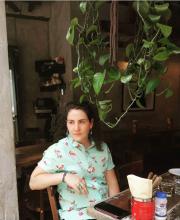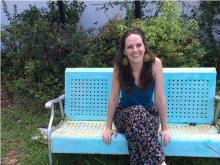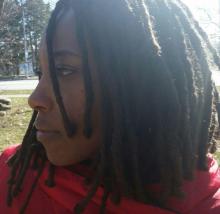With great pleasure, we announce the finalists, winners, and honorable mentions in the 2018 International Literary Awards, sponsored by Center for Women Writers at Salem College. The submissions went through two rounds of readers before being sent along to the judges, who had the hard and rewarding task of selecting the final winners and honorable mentions. The process was fair: the readers read anonymously. The judges received the names of the winners only minutes prior to the public receiving the information.
Winners in each category receive a cash award of $1,000.
Honorable mentions in each category receive a cash award of $150.
Without further ado, we present the winners!

Annie Virginia is a poet with her BA from Sarah Lawrence College. She is currently transitioning out of her role as a high school English and Creative Writing teacher so she can pursue her MFA. Annie Virginia’s work may be found in The Dead Mule School of Southern Literature, The Legendary, The Literary Bohemian, Cactus Heart, and decomP as well as in the anthologies The Queer South and A Shadow Map: An Anthology by Survivors of Sexual Assault. Her work was nominated by Broad! for a Pushcart prize.
Aurielle Marie is a Black, Atlanta-born, Queer hip-hop scholar and a community organizer. Through her work as a poet and an activist, she explores the uses of intimacy and ritual in the practice of Black resistance. Aurielle is a 2018 Lambda Literary Writer Retreat fellow, a 2017 Roddenberry Fellowship Finalist, a Voices of Our Nation Fellow-Alum, a 2016 Kopkind Fellow, and a current Queer Emerging Artist-In-Residence at Destiny Art Center. She was chosen by Safiya Sinclair as the 2017 Poetry Prize Winner for Blue Mesa Review. She has been featured as a social-political pundit on CNN. Her essays and poems have been published widely and her work has been featured on a global host of stages, most prestigiously in her grandmother's kitchen.
The lush, nimble language and expertly woven construction of this contrapuntal poem is what left me continually rereading “A Cleave for The Women Who Lay In My Mess,” though it was the title that drew me in first, as, like the poem that follows, it can be read in many distinct and fascinating ways. Because it can be read so variously, it offers a true richness of experience, and seems to continuously unveil truths and secrets: “your mother’s legacy // a fool, a tide” or “your mother’s legacy / your lover’s tongue.” It’s either, it’s both, it’s a remarkable poem.
Ashwini Bhasi, “Cow Tries to Save Girl” and “Letter to My Unknown Lover”
Liz Bowen, “No Heroes” M Soledad Caballero, “What is Cancer but Love”
Michelle Burke, “All the Dads are Dying”
Caroline Crew, “Longshore”
Sara Fetherolf, “The Great Wave”
Aurielle Marie, “Psalm for Yahweh in 15 Verses” and “A Cleave for The Rebecca Olander, “Unearthing and Burying My Old Friend with a Golden Shovel”
Meghann Plunkett, “How to Break a Horse”
Women Who Lay In My Mess” Vivian Faith Prescott, “Geological Force”
Paige Quiñones, “Ode to Hysteria, Ode to Anhedonia"
Kerry Rawlinson, “A Consonant; A Vowel”
Molly Raynor, “as bone/as flag”
Caitlin Roach, “After the hunt”
Heidi Seaborn, “How I Came of Age”
Darlene Scott, “How to Grow a Girl”
Kelly Grace Thomas, “Femininity as Math Problem (in Attempt to Solve for X)”
Annie Virginia, “September was no good”

Eliza Smith is an MFA candidate at The Ohio State University, where she serves as the Reviews and Interviews Editor of The Journal. She received her MA from the Missouri School of Journalism. Her work has appeared in The Pinch and Indiana Review.
Farnaz Fatemi’s poetry and prose appears or is forthcoming in Tupelo Quarterly, Catamaran Literary Reader, Delaware Poetry Review, and elsewhere. She has been awarded residencies from PLAYA, Marble House Project, Vermont Studio Center, and I-Park Foundation, and honored by Poets on the Verge (Litquake SF), Best of the Net Nonfiction, and Pushcart. She taught Writing at the University of California, Santa Cruz, from 1997-2018.
An Incomplete History of the Times We Did and Didn’t Leave”: With empathy and a sort of urgent, clear-eyed curiosity, "An Incomplete History of the Times We Did and Didn’t Leave” explores the narrator’s matrilineal inheritance of grief and restlessness, of desire and dread. Told through snapshots of her mother’s life, her grandmother’s life, her sister’s, and her own, and The narrative moves deftly through time with skillful, sharp transitions from personal memory to family lore and back again. It is a story about the importance of story, about the burden and blessing of narrative, about being a woman in relation to other women and about loss: of memory and vision and identity. By looking unflinchingly toward the past, the narrator carries us into her future.
"Sister Tongue": Thick with striking sensory detail and lingering images, "Sister Tongue" traces the narrator’s return to Tehran after 25 years abroad. It is lush and lamenting, returning again and again to the tongue, the mouth, the breath, considering both the power and constraints of language and the work of silence in family connections and the continuous shift of one’s sense of self. A truly gorgeous piece of writing.
- Anne-Marie Blanchard, “Live at the Troubadour”
- Charmaine Cadeau, “Moonstruck”
- Melissa Carroll, “Stillbirth”
- May-lee Chai, “Unimaginable Women”
- Natalie D-Napoleon, “Finding Napoleon”
- Meiloni Erickson, “Shit”
- Farnaz Fatemi, “Sister Tongue”
- Lea Page, “Waiting for Words”
- Lynn Palermo, “The Flesh of History”
- Michael Palmer, “Mormonism: A Lament”
- Adriana Paramo, “Me Pei Morana and I Went to England”
- Grace Prasad, “Scrabble”
- Catherine Raven, “On Plan!”
- Rose Marie Sabangan, “Floodwaters”
- Katherine Schaefer, “AND. . .NO. . .OR”
- Katie Simon, “Meltwater”
- Eliza Smith, “An Incomplete History of the Times We Did and Didn’t Leave”
- Denise Tolan, “Divisible by Thirteen”
- Sandra Tolbert, “Lydia’s Monologue”
- Angela Yarber, “Duster to Dust”

Kristen Gentry is from Louisville, Kentucky and received her MFA from Indiana University. She currently lives in Rochester, NY near SUNY Geneseo where she is an associate professor of English and the director of creative writing. Her short stories have appeared in Crab Orchard Review, Jabberwock Review, and other journals. She is at work completing Mama Said, a collection of linked stories that explore mother-daughter relationships strained by the mothers’ drug addictions.
Elizabeth Tchoungui is a franco-cameroonian writer and journalist. She was the first African journalist to present the news on the international francophone television channel TV5 Monde and was the first woman to host the emblematic cultural segment of France's leading public news channel, France 2. Tchoungui is the author of numerous works including Je vous souhaite la pluie, taught in in schools in Cameroon, and Bamako climax, a novel that explores terrorism in the Sahel region of Africa. Tchoungui holds the title of Chevalier des Arts et Lettres.
Siobhan Marie Meï, translator of “Diane, Enchantress”
Siobhan Marie Meï is a PhD candidate in Comparative Literature at the University of Massachusetts Amherst. Her translations and original poetry have appeared in carte blanche, The Adirondack Review, Transference, and Asymptote.
This lyric story has the rhythm of poetry as it invites the reader into grief, mothering, daughtering and depression. A tour-de-force use of second person point of view, this writer lulls the reader with beautiful language inviting us into the deep exploration of these characters and their difficult lives. This story called to me again and again. I couldn’t just read it once. This writer has control of her craft.
A deftly rendered story of emotion, passion and femininity rich with imagery, eroticism and sense of self. Strong writing, strong language.
- Cheyenne Autry, “Ten-Mile Loop”
- Ellen Wade Beals, “My gold star birthday”
- Dinah Cox, “Joey Mullins is Not the Narrator”
- Jane Neathery Cutler, “Current”
- Elizabeth DeBunce, “Settled Down”
- Desiree Evans, “Blood in the Water”
- M Feehan, “Two Crow Joy”
- Amina Gautier, “Hungry Like the Wolf”
- Kristen Gentry, “Mama Said”
- Jarrett Kaufman, “We Live Here”
- Laura Ruth Loomis, “The Missing Stair”
- Meagan Lucas, “Voluntary Action”
- Siobhan Meï, “Diane, Enchantress”
- JL Morin, “Proper Distance”
- Ray Morrison, “Poke”
- Kaitlin Murphy-Knudsen, “The Intrusions”
- Margie Shaheed, “Playground Stories”
- Kate Osana Simonian, “Transference”
- Saba Waheed, “The Magic in the Waiting” and “A Dog’s Life”
They keep saying he was an only child. As if we could fill the empty seat with someone else.” The sentences in “September was no good.” are deceptively simple. They build and build into a testament to how tragically commonplace gun violence against young black men is in this country and they layer themselves in a complex way that mirrors the grieving process. This poem reaches big by also reaching small; much of the poem reflects how the world moves on after someone dies, moves on changed. It demands we remember and notice those changes. It is exhilarating to read a poem that holds on with both its heart and its craft in equal measure, and through a significant length without letting up at all. This poem is crucial reading and crucial honoring; a significant achievement.